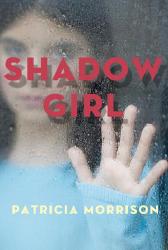Review
Shadow Girl
- Patricia Morrison
- Tundra Books, 2013

Shadow Girl is a haunting book about alcoholism, poverty, and their social consequences. The cover copy describes this novel as heartbreaking, and I agree. I found Shadow Girl very affecting and sad, but it’s a powerful realistic novel that offers strong observations on how immediately family problems and social problems affect children’s lives.
When the text opens in December 1963, Jules is an eleven-year-old girl carrying heavy burdens. She is hungry, her father hasn’t bought groceries for a while, and there is nothing but a small amount of spoiled food left in the fridge. Except for Patsy, her best friend, Jules has few friends at school and is sometimes the object of bullying. She spends much of her out-of-school time at the Six Points Plaza, hanging around the Zellers toy department and pining after a doll she hopes to get for Christmas. Jules is resourceful and responsible, however; she keeps herself quietly amused, stays out of her father’s way when he’s drunk, and takes care of the house and herself as best she can.
One night, however, her father’s rage gets out of control, and he abandons Jules, leaving her by herself for several days. Eventually, a caring adult intervenes and Jules is taken into custody of social services. All she wants is for her father to come back to her, for things to be the way they once were. Slowly, Jules learns that that’s simply not possible. The book follows Jules as she comes to terms with life in foster care and the choices her father has made.
This is in many ways a difficult, unflinching book. Jules’ father, Joe, is an unlikeable character, and the adults he associates with are also negative and unattractive. One social worker is kind but ineffectual; another is bureaucratic and cold. The members of the first foster family Jules joins range from indifferent to hostile, and it’s only when Jules’ situation reaches a crisis that another solution is considered. I deeply appreciated the integrity with which the author examined the entwined issues of alcoholism, poverty, neglect, and forms of bias and prejudice. I also admire the author’s courage in producing such a bleak and unsparing study of her characters’ lives.
There are a few weaknesses in the text. The balance of showing versus telling is sometimes off, so at times the novel feels somewhat stilted. The narrative style — though not the content — emulates that of books from the early 1960s, and the exposition can feel somewhat didactic, particularly when Jules reflects on poverty and on religion. The conclusion also arrives very quickly, with limited resolution; to me, it felt truncated and not entirely believable.
Still, this is fiction for children, so the ending is modestly happy. Jules is clearly still deeply troubled, but readers see that she now has the potential for real hope in a genuinely caring foster situation. It’s muted hope, but still hope, and readers are left with the idea that positive change is possible no matter one’s circumstances.
Shadow Girl is certainly not for every reader, but thoughtful readers who seek out realistic fiction will likely enjoy this book. It’s sensitively and authentically written and very emotionally moving.
This review was originally published in Resource Links on April 2013.
